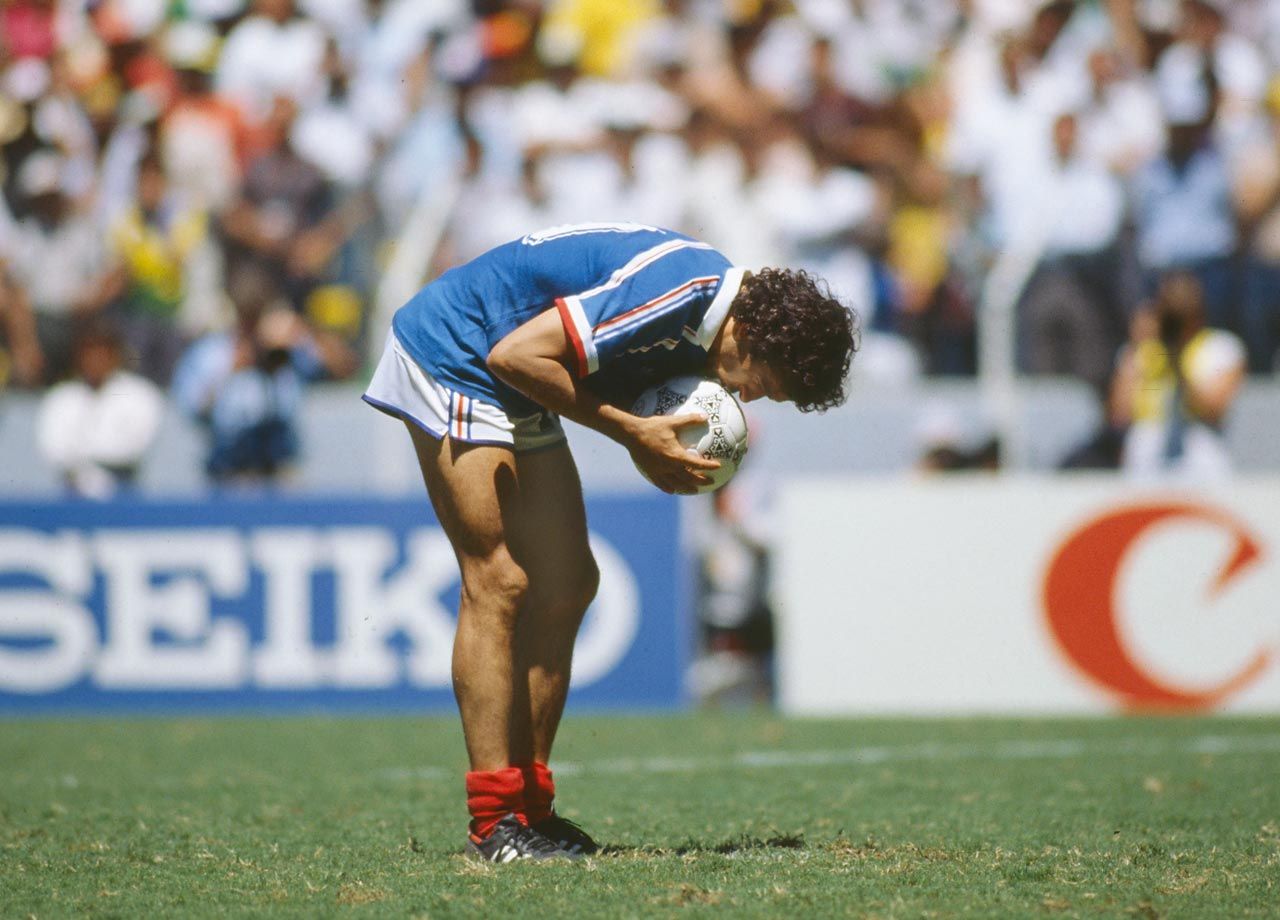Game of Chicken
Reliving the epic quarterfinal match between reigning European football champions, France, and 1983 Copa America runners-up, Brazil, at the 1986 World Cup in Mexico.

French captain, Michel Platini, about to take his penalty against Brazil at the 1986 World Cup.
Estadio Jalisco, Guadalajara, Mexico. June 21, 1986. France-Brazil, 73rd minute. Two seconds ago, Branco was rolling around, unsure what to grab to illustrate his pain—stomach? Ankle? Knee. Roll back. Scene. Now look at him: so happy with himself, ass in the grass, hands up in the air, calling his friends over to hug him, not a care in the world. Paleface thinks it’s all over. He thinks he’s won it for Brazil even though the ball’s not on the spot yet, much less behind the line. Fifteen minutes to go still and he thinks the game is over. He can’t see how they’d lose this.
I’m offended. Not because of the call: the foul is undeniable. Not because of this team: it’s hard not to like Brazil even when your team is playing them. But France were playing so well. As a goalie, surely: penalties are awful, lopsided affairs much easier to score than to save. I already know this to be true, though the games I play weekly take place on fields and goals small enough to make for better odds. But I accept it too: in the football justice system, referees punish fouls likely to have prevented a goal. Alright, then. No: the offense strikes deeper. Branco’s joy assaults a moral core in my 8 year-old soul. It’s the supreme indecency of celebrating obtaining a penalty, as if it was as good as done. It’s the casual arrogance, the cocksureness of their joy that irk me. It’s having to witness the infuriating spectacle of grown men gleefully counting their chickens before they are hatched, rolling on top of each other as if there was nothing for you to do about it but tiptoe on eggshells. Sitting awestruck next to my dad in a sun-flooded living room, seconds tolling down under the ceaseless chatter of commentators, I hope Bats shows the fowl that counts is the weirdly rounded rooster on his jersey’s crest.
Joël Bats awaits. In the exact middle of his goal he half-crouches, gloved hands flat on his thighs, toes on the line, virtually immobile, staring straight ahead. Zico has put his ball on the spot; as he leisurely walks backwards for the shot, he studiously avoids the keeper’s eyes. Players milling about vacate the box in slow motion. The camera angle lies: it shows but two French players crowding the tall lanky figure of Socrates, Careca moving up closer behind them, all on the keeper’s left side. None of them seems too convinced they will be needed. Later, another angle tells: there were two French players on the other side of the box, Platini standing dead center behind Zico, hands on his hips, tired. No Brazilian nearby. Does Bats read into Socrates and Careca’s positions the side Zico will choose? The Brazilian runs and hits a mediocre ball—middling height, middling strength, and vaguely to the left of Bats. The keeper did not anticipate, he waited, endlessly, excruciatingly, until the last moment, to dive and push Zico’s shot away. It lands near the cluster of players on his left, and after an initial lull Tigana gains the inches necessary to kick the ball out of Socrates’ reach. Inexplicably, the ref awards a goal kick.
The penalty series that eventually decides the game is one for the ages. Platini misses on his birthday, his teammate Bellone scores off the head of Brazilian keeper Carlos. Count your roosters. The deciding moment, though, the one that leaves a trace, is Brazil’s first penalty. Socrates, philosopher, founder of the Corinthian Democracy, steps up. He walks what seems twenty miles to the spot, a living monument of cool, all affected ease, Carioca sprezzatura. Socrates only ever takes four steps and four steps away he stands, staring down Bats, assessing the rooster in his crouching stance. They’re playing chicken: Socrates pauses for an interminable second on his second step, a slow motion paradinha, a dare. Move, it says; flinch. A week before he did the same thing against Poland and the goalie Mlynarczyk broke. But Bats waits. He gives nothing. Socrates breaks and takes his shot; Bats chooses the right side, leaping to punch the ball out of the frame and Socrates out of the World Cup.
Home to roost.



